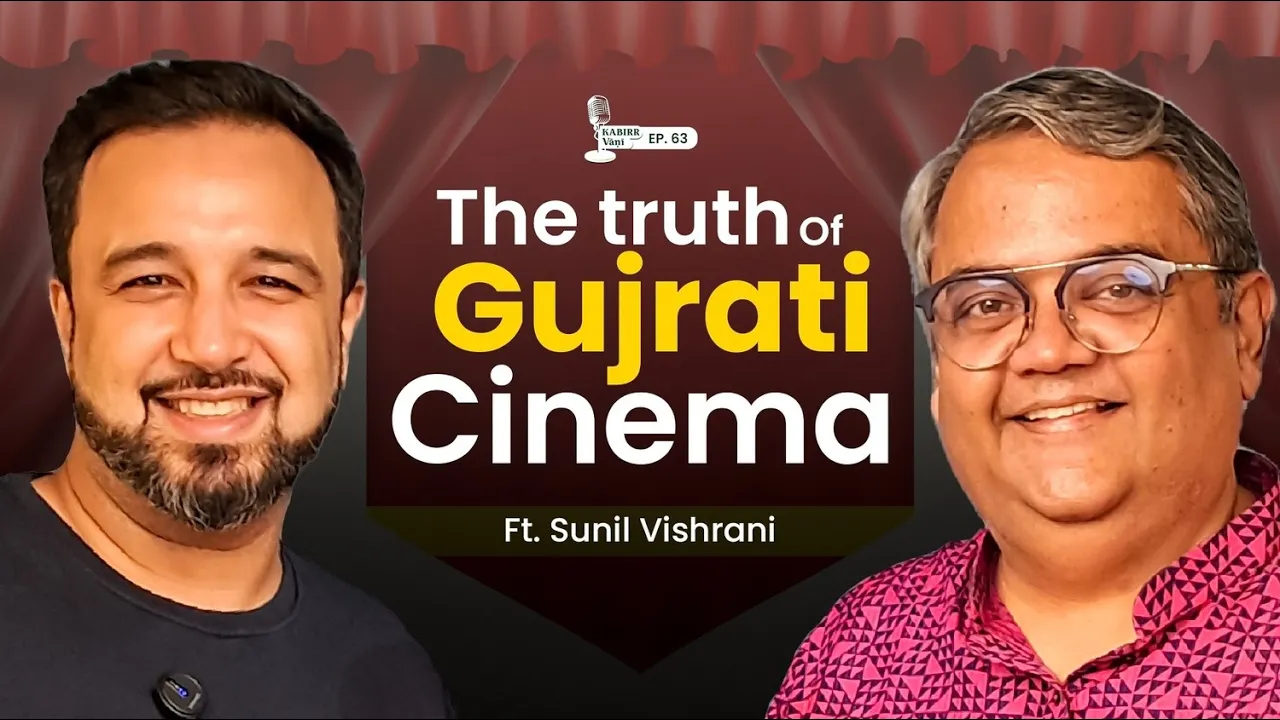Sunil Vishrani: From Gujarati Stage to Cinema’s Changing World
In the vibrant landscape of Indian entertainment, few actors have carried the spirit of Gujarati theatre into cinema as gracefully as Sunil Vishrani.
On the Kabir Vani Podcast, he opened up about his humble beginnings, the world of auditions, the future of Gujarati cinema, the rise of OTT, and how spirituality and discipline guide his journey. His insights blend humor, honesty, and wisdom — offering a raw look into the life of a performer who has balanced art, family, and changing times.

Breaking Out with Sania Mirza
Every actor remembers their first big break. For Vishrani, one defining moment was a Sprite commercial with tennis icon Sania Mirza. The ad opened doors to more projects, proving how commercials can create visibility for stage actors trying to enter mainstream media.
This crossover — from stage to screen — is never easy. But Vishrani insists that discipline and patience are the only two currencies that matter for survival in the entertainment industry.
Roots in Gujarati Theatre
Before cinema, Vishrani lived and breathed Gujarati theatre. The stage taught him timing, improvisation, and the value of rehearsals. Unlike films, theatre leaves no room for retakes — every show is live, every mistake is public, and every performance is a fresh challenge.
Gujarati cinema, however, often struggles with limited visibility compared to Hindi or English cinema. Vishrani believes that while Gujarati audiences love theatre, the industry needs more systematic promotion, better production budgets, and platforms to showcase talent.
Television and Serials: The First Step to Recognition
From Baa Bahu aur babu to Tarak mehta ka oolta chasma serials, television gave Vishrani recognition beyond theatre. TV serials, he explains, are often a double-edged sword: they bring stability and visibility but can also limit artistic growth because of rigid scripts and fast-paced production.
Yet, for actors from regional backgrounds, television is often the gateway to films. It was no different for Vishrani, who used every opportunity on TV to sharpen his craft and expand his reach.
Gujarati Cinema vs Hindi Cinema
One of the most striking parts of the conversation was his honest comparison of Gujarati cinema and Hindi cinema.
- Gujarati films often lack marketing budgets, which makes it difficult for them to compete with Bollywood releases.
- Actors and directors in Gujarat work with passion-driven projects, while Hindi films are more industry-driven with clear financial backing.
- Gujarati cinema is evolving, and Vishrani is grateful to the government support for making shooting location, permissions, and subsidies an easy process. He would request more support in wider distribution, and platforms like OTT to showcase local stories to global audiences.
He highlights that regional cinema has the potential to tell authentic stories rooted in culture, but it must adapt to changing expectations.
Auditions, Struggles, and Industry Competition
For newcomers, the audition room can be intimidating. Vishrani shares how even established actors are not immune to rejections.
“Every audition is a reminder that you’re only as good as your last performance. Nothing is permanent here.” – Sunil Vishrani
He advises young actors to focus on craft rather than contacts. In the long run, talent and discipline outweigh shortcuts.
The Rise of OTT and AI in Cinema
Vishrani has witnessed the digital explosion firsthand. Platforms like Netflix, Amazon Prime, and Sony LIV have opened doors for regional content and character actors. He calls OTT a blessing for performers because it values realistic acting over star power.
On AI in cinema, Vishrani acknowledges its power but insists that no technology can replace the emotional depth of human performance. For him, cinema is not just visuals — it is emotion, and that can never be automated.
Spirituality, Discipline, and Family Values
Despite the glamour of the industry, Vishrani remains deeply rooted in spirituality and family. He credits his parents for teaching him humility and discipline, values he carries into his professional life.
For him, acting is not just a career but also a spiritual practice — a way of living truthfully in different characters while staying grounded in real life.
Working with Legends
Over his career, Vishrani has worked alongside icons from Amitabh Bachchan to Rishi Kapoor. Each collaboration, he says, reinforced one truth: the bigger the artist, the more humble they are.
Watching legends at work gave him not just lessons in craft but also in professionalism, humility, and respect for co-actors.
Advice for Young Actors
Vishrani’s message to aspiring actors is simple but powerful:
- Respect your craft. Don’t chase fame, chase growth.
- Be patient. Breakthroughs take time.
- Stay grounded. Fame fades, discipline doesn’t.
- Balance family and career. Success is incomplete if it comes at the cost of relationships.
“Don’t run after becoming a star. Run after becoming an actor. Stardom may or may not come — craft will always stay with you.” – Sunil Vishrani
Closing Thoughts
Sunil Vishrani’s story is a reminder that regional artists are the backbone of Indian cinema. They bring authenticity, resilience, and cultural richness that star-driven industries often overlook.
His journey from Gujarati theatre to cinema screens mirrors the struggles of thousands of actors who fight for recognition while holding onto values of humility and hard work.
You can listen to the full conversation with Sunil Vishrani on the Kabir Vani Podcast, available on Spotify, Apple Podcasts, and Amazon Prime Music.



